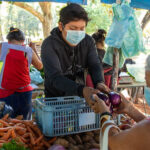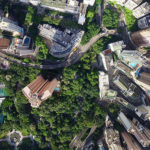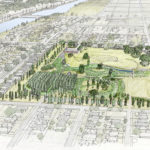Posts tagged with 'WRI Ross Center Prize for Cities'
“You can’t resolve the climate crisis without resolving cities,” says Rogier van den Berg, acting global director at WRI Ross Center for Sustainable Cities, in a new podcast. Speaking with Kes McComick of the International Institute for Industrial Environmental Economics ...

History shows that when disasters and crises strike, cities often bounce back stronger and more resilient than before. The great Chicago fire famously gave rise to skyscrapers. Infectious disease outbreaks led to public health policies and modern sanitation. The devastation of World War II catalyzed unprecedented ...

Infectious disease outbreaks can have enduring influence on urban design and several have irrevocably shaped how modern cities feel and function. For example, parks, wide street design and even the home bathroom are all important legacies of cholera outbreaks; today, ...

Two years ago, I participated in the learning roundtable for the first cycle of the WRI Ross Center Prize for Cities. I confess that my expectations were rather moderate, but that, to my surprise, I found it truly refreshing and ...

The WRI Ross Center Prize for Cities is the premier global award celebrating and spotlighting transformative urban change, and its $250,000 grand prize winner for 2020-21 has been announced: Sustainable Food Production for a Resilient Rosario, an urban agriculture project from ...

EDITOR’S NOTE: Sustainable Food Production for a Resilient Rosario won the 2020-2021 Prize for Cities on June 29, 2021. Learn more here. (June 29, 2021) The residents of Rosario, Argentina’s third-largest city, are no strangers to crises. When the country’s economy ...

Half a century ago, a lethal haze of smoke and fog, otherwise known as the Great Smog of 1952, covered London and killed as many as 12,000 people. More recently, in 2013, Ella Adoo-Kissi-Debrah died at the hands of air pollution. ...

The WRI Ross Center Prize for Cities is the premier global award celebrating and spotlighting transformative urban change. The five finalists for the $250,000 prize come from very different urban environments — in Kenya, Argentina, Mexico, India and the United ...

During Caroline Owala’s childhood, flooding during rainstorms was a normal occurrence. “When it rained, it would be very difficult for us to even sleep because the flooding would get into the houses,” she told WRI. Caroline grew up in Kibera, ...

Monterrey, like other major Mexican cities, rapidly expanded outward during the end of the 20th century. New policies favored investment in new suburban neighborhoods, attracting residents and businesses to the periphery, and provoking several decades of insecurity and population decline. ...

During the summers, in the crowded informal settlement she calls home in Ahmedabad, India, Meenaben would lay wet jute on the floor and hay on the roof of her home to lower the temperature inside. If she didn’t, her home ...

EDITOR’S NOTE: Sustainable Food Production for a Resilient Rosario won the 2020-2021 Prize for Cities on June 29, 2021. Learn more here. (June 29, 2021) City life can be deeply unfair. This was true before the COVID-19 pandemic exposed just how ...

“Acknowledgement, voice and the right to negotiate” – that’s what’s needed to bring the world’s urban poor back into the system and begin creating cities that work for everyone, said Sheela Patel, chair of Slum/Shack Dwellers International (SDI), at the 10th ...

In the 21st century, a seemingly global prosperity masks an unequal distribution of benefits. Nowhere is this more apparent than in the world’s cities, where extreme wealth can exist next door to concentrated poverty. In some cities, like those in South Africa, ...

Big ideas can forever alter the fate of cities when they are written into cement, steel and stone. When St. Petersburg, Russia, was created in 1703 by Peter the Great, he envisioned the new capital as an emblem of a modern ...














![Inclusive Cities for a Changing Climate: Prize for Cities 2020-2021 Grand Prize Winner [PODCAST]](https://thecityfix.com/wp-content/uploads/2021/07/51127889682_16af7952fe_k-690-150x150.jpg)


![5 Finalists Transforming Urban Spaces: The 2020-2021 Prize for Cities [PODCAST]](https://thecityfix.com/wp-content/uploads/2021/06/PfC-podcast-690-150x150.jpg)








